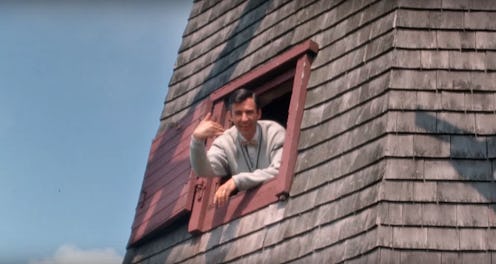Entertainment
What The New Mr. Rogers Doc Can Teach Us All About Dealing With Fear & Uncertainty
For those who remember Fred Rogers as a gentle man who talked to puppets on public television, the new documentary Won't You Be My Neighbor has some surprises in store. Not so much about Rogers' public perception — he truly was the sweet, thoughtful guy he appeared to be — but about what he was trying to achieve. Under those hand-knit cardigans beat the heart of a radical ahead of his time and who tried to give a young generation the tools they'd need to deal with a divisive world, especially when it came to fear.
"That was the thing he was zeroed in on. What are you afraid of?" says Won't You Be My Neighbor director Morgan Neville, speaking in New York in June. "Fear was so important, because fear left untreated becomes anger, and hatred, and resentment, and all the toxic things we have. So a lot of what [Rogers did was] trying to quell fear."
Beginning each episode of Mr. Rogers Neighborhood with the same slow ritual of changing into his cardigan and sneakers, Rogers created a soothing, safe atmosphere right from the start. He invited viewers into his home and making them feel comfortable, before talking straightforwardly on topics many might think unsuitable for children, including war, divorce, and assassination. As Rogers explained in a 2000 interview with CNN, he wanted to speak to kids at their level, noting that "children have very deep feelings, just the way everybody does." And most importantly, he wanted to address their fears.
"When you grow up, you mask your feelings, hide your intentions, you become cynical and have no patience for any of that," Neville says now. "People tend to act very badly or rashly or resentfully because they haven’t actually processed fears, so I feel like that’s the therapy [Mr. Rogers] was doing."
By speaking honestly and directly, Rogers encouraged his audience to do the same, letting them know feelings weren't anything to be ashamed of, and that talking about them could often help. In an era where seeking psychological treatment was seen as a weakness, where going to a "shrink" was a mark of something deeply wrong, Rogers tried to give viewers not only ways to process emotions, but permission to do so. And in a world that's only gotten louder and more discordant, Rogers' silence and unhurried pace seem even more revolutionary than when they first aired.
"In a way, a lot of what he was doing was what we now call mindfulness," Neville explains. "There was a certain cultural craving for some of that space and slowness, and consideration that we don’t get." The documentary, out now, highlights a perfect example from the show, where Rogers asks viewers to experience a minute with him. So he and his guest just sit there, for the full duration of a minute. Can you imagine anything like that on television today?
Yet while Rogers' style is beloved by many today, some people criticized it at the time. "His show was simple and deep, but the cultural perception is simple is superficial," said Neville. "I think [Rogers] struggled with the fact that people didn’t appreciate the depth of what he was doing in his own time." With the likes of the Wall Street Journal and Fox News blaming "millennial entitlement" on his message of self-acceptance and unconditional love, it's clear Rogers is still misunderstood by some people today. But his lessons in emotional intelligence weren't about blind confidence; they were about how thoughtful questioning and examination can lead to greater compassion.
"He was always trying to understand," Neville says, adding that in today's politically fraught days, that understanding has even greater urgency. "It’s something I really tried to honor in the film, trying to turn it back on the audience and say this isn’t about him, but it’s about you. It’s about all of us. This is what he would be saying. We each have moral responsibility in this situation."
The biggest shock of Won't You Be My Neighbor is realizing Rogers struggled to take these same lessons to heart himself. "He was full of insecurity and doubt," Neville says. "The need to be loved was always there. And I don’t think he ever felt like he had achieved a total love." As sad as that it is to hear that, it's a comfort to know that regardless, Rogers reached out and helped so many other people. As Neville puts it, "The idea he talked about the most was one of grace. The idea of grace being, putting kindness into the world." And in this polarized world, Won't You Be My Neighbor is a small kindness we can all enjoy.
